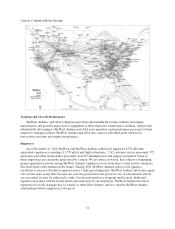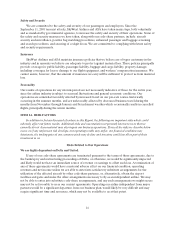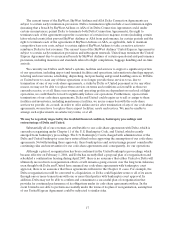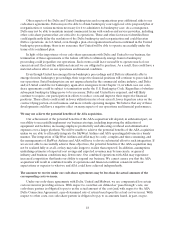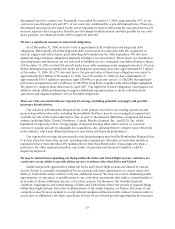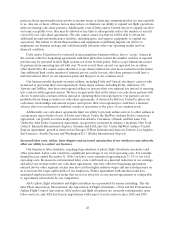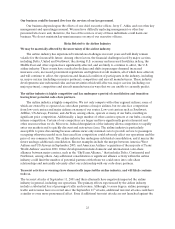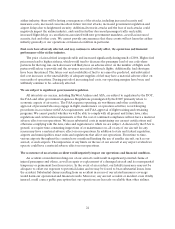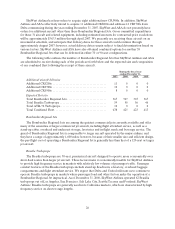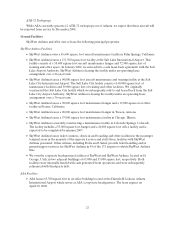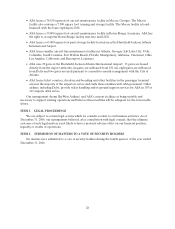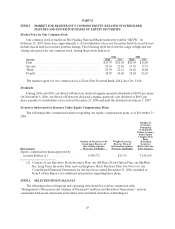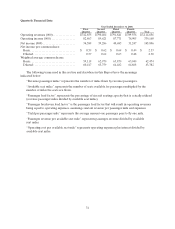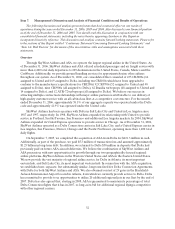SkyWest Airlines 2006 Annual Report Download - page 29
Download and view the complete annual report
Please find page 29 of the 2006 SkyWest Airlines annual report below. You can navigate through the pages in the report by either clicking on the pages listed below, or by using the keyword search tool below to find specific information within the annual report.23
Our business could be harmed if we lose the services of ourkey personnel.
Our business depends upon the efforts of our chief executive officer, Jerry C. Atkin, and our other key
management and operating personnel. We mayhave difficulty replacing management or other key
personnelwho leave and, therefore, the loss of the servicesof any of these individuals could harm our
business. We do not maintainkey-man insurance on anyof our executive officers.
Risks Related to the Airline Industry
We may be materially affected by the uncertainty of the airline industry.
Theairline industry has experienced tremendouschallenges in recent years and will likely remain
volatile for the foreseeablefuture. Among other factors, thefinancial challenges faced by major carriers,
including Delta, United andNorthwest, the slowing U.S. economy and increased hostilities in Iraq, the
Middle East and other regions have significantly affected, and are likely to continueto affect, the U.S.
airline industry. These events have resulted in declines and shifts in passenger demand, increased
insurance costs, increased government regulations and tightened credit markets, all of which have affected,
and will continue to affect, theoperations and financial condition of participants in the industry, including
us, majorcarriers (including our major partners),competitors andaircraft manufacturers. These industry
developments raise substantial risks anduncertainties which will affect us, major carriers (including our
major partners), competitors and aircraft manufacturers in ways that we are unable to currently predict.
The airline industry is highly competitive and has undergone a period of consolidation and transition
leaving fewer potential code-share partners.
Theairline industry is highly competitive.Wenot only compete with other regional airlines, some of
which are owned by or operated as code-share partners of major airlines, but we alsoface competition
from low-cost carriers and major airlineson many of ourroutes. Low-cost carriers such as Southwest,
JetBlue, US Airways, Frontier, andAirTran, amongothers, operate at many of our hubs, resulting in
significant price competition. Additionally, alarge number of other carriers operate at ourhubs, creating
intense competition. Certain of our competitors are larger and have significantly greater financial and
otherresourcesthan we do. Moreover, federal deregulation of the industry allows competitors to rapidly
enter our markets and to quickly discount and restructure fares. The airlineindustry is particularly
susceptible to price discounting becauseairlines incur only nominal costs to provide service to passengers
occupying otherwise unsoldseats. Increasedfare competition couldadversely affect our operations and the
price of our common stock. The airline industry has undergone substantial consolidation, and it may in the
future undergo additional consolidation. Recent examples include the merger between America West
Airlines and US Airways in September 2005, andAmerican Airlines’ acquisition of the majority of Trans
World Airlines’ assets in 2001. Other developments include domestic and international code-share
alliances between major carriers, such as the“SkyTeam Alliance,” that includes Delta, Continental and
Northwest, among others. Any additional consolidation or significantalliance activity within the airline
industry could limit the number of potential partners with whom we couldenter intocode-share
relationships and materially adversely affect ourrelationshipwith our code-share partners.
Terrorist activities or warnings have dramatically impacted the airline industry, and will likely continue
to do so.
Theterrorist attacks of September 11, 2001 and theiraftermath have negatively impacted theairline
industry in general, includingour operations. The primaryeffects experienced by the airline industry
include a substantial loss of passenger traffic andrevenue. Although,to some degree, airline passenger
traffic and revenue have recoveredsince the September11th attacks, additional terrorist attacks could have
asimilar or even more pronouncedeffect. Even if additional terrorist attacks are not launched against the



